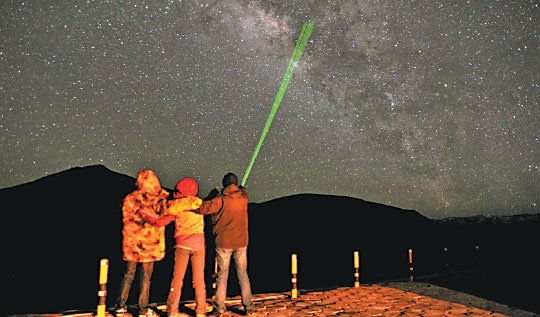
Amateur astronomers watch the stars at the Dark-Sky Reserve in Ngari. (Wang Xiaohua/for China Daily)
Rising concerns
Frustrated by the bright nights in Beijing, Zhan Xiang, an enthusiastic stargazer, drives hundreds of kilometers during weekends and vacations to view the night sky and revel in childhood memories of watching the stars.
"The night sky is part of our natural heritage. It's a huge loss because it has existed since time immemorial," said the 34-year-old, who works at the Beijing Planetarium popularizing astronomy among young people.
Zhan runs MountainStar, a group that organizes driving trips and events designed to help more people discover the "hidden" galaxy. The group, which was founded in 2010 and has more than 100 members, is now calling for more attention to be paid to the problem of light pollution.
The growing public interest in the universe and concerns about the effects of artificial lighting have been recognized by the central government and related organizations. That has led to strengthened protection of the night skies in recent years.
For example, the China Biodiversity Conservation and Green Development Foundation's Starry Sky Working Committee, which focuses on astronomical research, have established dark-sky parks in Tibet's Ngari and Nagqu prefectures in a bid to protect clear night skies.
"It's the first step in our efforts to prevent the spread of artificial light," said Wang Xiaohua, head of the foundation's star protection branch. "But we need more to make a difference."
So far, none of China's dark-sky parks has been certified by the International Dark-Sky Association, a nongovernmental organization that gives awards to "spaces protected for natural conservation that implement good outdoor light and provide dark sky programs for visitors".
Wang Xiaohua, head of the association's China office, said public interest is growing, but has little real influence at present, which means more governments should support and facilitate efforts to reduce light pollution.
"We plan to establish more parks and reserves around China's megacities, such as in the suburbs of Beijing, as a way of informing the public about light pollution by providing easier accesses to dark sky (rather than traveling to Tibet and other locations)," Wang said.
In a wider sphere, the association is looking at ways of combining dark-sky protection programs and tourism. In September, it joined with the Elion Resources Group, which manages natural resources, to create a dark-sky protection zone in the Kubuqi desert, near Ordos in the Inner Mongolia autonomous region.
Miao Genxi, Elion's vice-president, said that in addition to boosting dark-sky protection, the zone will also retard desertification and help preserve the natural environment through tourism.
Wang believes the zone will perform a vital function. "Protection always goes ahead of exploration," he said.


















































